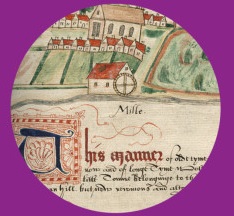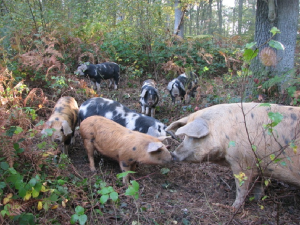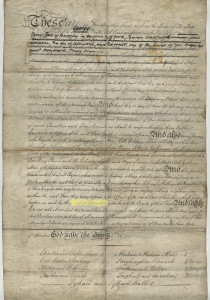As one of their first tasks, the Twixt Thistle and Rose volunteers catalogued our 17 bundles of posters and letters received by the Berwick Police Force between 1880 and 1900. Whilst checking their work for mounting on our electronic catalogue, I came across these two documents in a bundle – a memo and telegram.
They were both dated Christmas Eve 1895 and were sent to Superintendent Garden of Berwick from Inspector Jackson of the Roxburghshire Constabulary in Kelso concerning George Henderson.

Kelso 3.21 pm sent, received 3.26 pm 24 Dec 1895
Find out quickly if Whitehead of Houndridge is in Berwick. Henderson Red Lion can give you description and some information, Hotels likely, anxious.
Jackson
This was followed by :

Roxburghshire Constabulary
Kelso, 24th Decr 1895
Memorandum to Mr Supt. Garden, Berwick
Sir,
Re Geo Whitehead
This is a young farmer who is going
through his life and his means at the gallop.
His agent here , our Procurator Fiscal was aware of
His having been at Red Lion Hotel prior to 16th and leaving
on that date but he has been told that Whitehead
has returned to Berwick and was drinking at one of the
Hotels probably confined to bed. If you have not
enquired at other Hotels besides Red Lion will you kindly have
Enquiry made and let me know result. Wishing you
The Seasons Compliments.
Yours truly
E Jackson, Insp
I was intrigued by the concern of Inspector Jackson of Roxburgh Police for the “young farmer” and his taking the trouble to send this handwritten memo to the Berwick Police. I decided to see if I could find out anything further about him. The telegram mentioned he came from Houndridge in Ednam and so I checked the 1891 census for this property. I discovered a George Whitehead, farmer, head of the household, aged 19 living there with a servant. Agnes Douglas, aged 45. There was no reference to his parents and so where were they ? On checking the 1881 census for Houndridge, George was there, aged 9 with his mother and father – William, a farmer, aged 61 and Elizabeth, aged 51. William was described as a farmer of 247 acres, all arable, employing 6 men and 4 women.
George’s parents must have died between 1881 and 1891 and so, I checked deaths on Scotlandspeople (www.scotlandspeople.gov.uk ) and found that William died in 1881, aged 61 and Elizabeth died in 1885, aged 55. Therefore George was an orphan by the time he was a teenager.
Did George’s lack of direction from parents lead him to drink or was he easily influenced ? Why did he come to Berwick and was known to the publican at the Red Lion Inn

I have been unable to find anything further on George despite searching the newspapers online and the census. He just seems to disappear after 1895. He wasn’t at Houndridge in 1901.
Does anyone know what happened to him ? Did he emigrate or change his ways ? If anyone has further information on him, please let the TTAR team know.




